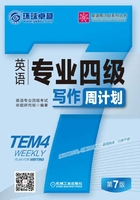
星期一 新题型大纲解读
测试要求:自2016年起,专四考试写作部分改革,要求根据所给的题目、图表或阅读材料等,写一篇200词左右的作文。能做到内容切题完整、条理清楚、结构严谨、语法正确、语言通顺、表达得体。考试时间为45分钟,所占分值比例为20%。
改革解读:(1)原Section B 便条部分取消。
(2)命题更加多样化:由原来的根据既定题目写作形式变为根据所给题目、图表或阅读材料来写作文。
(3)写作分值由原来的25分变为20分。
一、专四写作评分标准
1.总体原则
专四短文写作采用总体评分方法,阅读人员从内容和语言两个方面对作文进行综合评判。一般来说,阅卷人员评分时综合考虑以下几个问题:
1)作文是否体现主题思想,即是否切题。
2)作文的组织结构是否合理,是否完成了三段式写作任务。
3)篇章是否得以自然衔接,句式、用词是否多样化。
4)语言是否畅通,是否有重大语法、文字错误。
为了便于说明,以下图展示解释:

2.评分标准
具体标准的短文写作满分为20分,评分标准分五个等级:20~17分、16~13分、12~9分、8~5分、4~1分。

(续)

注:交白卷者,或作文与题目毫不相关,或只写几个单词,则以零分计算。
3.词数要求
目前,专四短文写作部分要求的词数大约是200,如果词数不够,也会相应地扣分。累计词数为150~170,扣1分;累计词数为130~150,扣2分;累计词数为110~130,扣3分;累计词数为90~110,扣4分;累计词数为90以下,扣10分以上。
4.注意事项
另外,关于作文的评分还应注意以下几点:
1)如照抄提示原句,均不得计入所写词数。
2)只写一段者:0~4分;只写两段者:0~9分。(指规定写三段的作文)
3)按规定,考生作文若为0分,无论其总分是否高于60分,均做不及格处理;其作文高于0分,低于6分,报成绩时,需从总分中先减去6分,再加上作文的实际得分,也就是说,要从总分中减去作文实得分与6分之间的差额部分。
二、典型试题自测
本书使用提示:从2009年开始,英语专业四级考试的答题卡(ANSWER SHEET)由两张改为三张。为了让考生熟悉新的考试形式,本书一律采用最新考试的答题卡模式,写作部分均要求写在ANSWER SHEET THREE上。
Part Ⅵ Writing(45 MIN)(2017年英语专业四级真题作文)
Read carefully the following excerpt and then write your response in NO LESS THAN 200 WORDS,in which you should:
1) summarize the main message of the excerpt,and then
2) comment on whether our brains will get lazy in a world run by intelligent machines.
You can support yourself with information from the excerpt.
Marks will be awarded for content relevance,content sufficiency,organization and language quality.Failure to follow the above instructions may result in a loss of marks.
Write your response on ANSWER SHEET THREE.
With Intelligent Machines to Do the Thinking,Will Our Brains Get Lazy?
Changing technology stimulates the brain and increases intelligence.But that may only be true if the technology challenges us.In a world run by intelligent machines,our lives could get a lot simpler.Would that make us less intelligent?
Artificial intelligence is taking over many human jobs.For instance,planes are being flown much of the time by automatic pilots.And the complex problem of controlling air traffic around large modern airports is also achieved by artificial intelligence that operates well beyond the capacity of mere human air traffic controllers.
Artificial intelligence is embedded in many features of modern life for the simple reason that intelligent machines can already outperform humans,including some aptitudes once thought to be a human advantage,such as playing chess,and writing poetry,or even novels.
As machines get smarter,they will do more of our thinking for us and make life easier.In the future,the electronic assistant will develop to the point that it serves similar functions as a real living butler,fulfilling requests such as:“Organize a dinner party for six on Thursday,Jeeves,and invite the usual guests.”
At that point,our long struggle with challenging technologies is at an end.Like Be Wooster,we can take it easy knowing that the hard work of planning and organizing is being done by a better brain—the electronic assistant.Starved of mental effort,our brains will regress.
新题型分析:写作命题的要求部分比较详细,分两部分:第一部分是一段介绍内容,引出写作话题,限定写作任务,说明写作目的;第二部分多了两段针对话题的阅读材料,包含正反双方的观点。
新题型解题思路:新题型结构构成:“命题+材料作文”对考生的阅读理解及归纳能力提出了更高的要求。这看似增加了负担,其实是提供了机会——为考生提供了大量的相关词汇和话题,作文的第二三段还可反复用到;而且写完一段总结,20分就算是拿到至少5分了。考生可以采取“简短概述材料—评论—总结”的写作模式。值得注意的是,在写作过程中,概述材料和进行评论缺一不可,而且概述材料不宜过长,否则将可能被扣分。
具体操作:用1~2句话简短提炼下文章观点,再从文章观点引出自己的观点即可。而接下来仍然是大家非常熟悉的“三段式”议论文写作:提出观点、论证观点、总结观点。
写作步骤:
第一部分:作文的第一部分简要总结阅读材料的主要观点,点明主题,引出自己的观点。
公式例示:现象阐述的引言+材料观点+我方观点
第二部分:2~3个分论点论证你的观点。To begin with…What's more…Furthermore…本部分的分论点要支持你的观点,逻辑清晰,句意简明,行文通顺。全文论述只用一个名称,例如we,people,the public,students等中的一个,最忌乱用名称,第一人称、第二人称和第三人称混用。
第三部分:总结(To conclude,Accordingly,To sum up…)+再次强调自己的观点。
要增强的能力:考生在阅读和写作训练中,需要增强概括观点、表达支持或反对意见的训练。
参考答案
Will Brains Get Lazy with Intelligent Machines to Do the Thinking?
With the wide use of intelligent machines,people began to worry about their threat to human intelligence.They hold the idea that even if the artificial intelligence is of great help to human jobs and facilitates life by doing more of our thinking for us,the development of the artificial intelligence will unavoidably deprive human of mental effort and cause the regress of our brain.From my perspective,the intelligent machines will not ruin our brain and get it lazy.
To begin with,computer-based artificial intelligence still needs human to operate.That is to say,people should write the computer program and give order for the work of those intelligent machines because they cannot operate autonomously.During this process,human will use his brain and keep those intelligent machines working.Therefore,it would be unlikely that human-level intelligence will be replaced completely.What's more,artificial intelligence is still a long way from replicating what their human counterparts can achieve.In order to make life more pleasant and convenient,humans are motivated to use their brains to explore more intelligent machines.
Accordingly,it's also extremely hard to believe that the human brains will get lazy with intelligent machines to do the things.Intelligent machines can make our life much easier but cannot replace human brains.
写作分析:
题目:Will Brains Get Lazy with Intelligent Machines to Do the Thinking?
写作点拨:开篇首先转述阅读材料中的观点:虽然人工智能给人类的生活带来了巨大的便利,使生活变得更容易,但随着智能机器在人类中的广泛应用,人类的大脑会变得越来越懒惰,甚至退化。作者由此引出了自己的观点,认为人工智能不能代替大脑,大脑也不会因为职能机器的广泛应用而退化。
行文分析:作者对文章中提出的观点进行了反驳,并给出了两个理由。即:
分论点一:To begin with,computer-based artificial intelligence still needs human to operate.That is to say,people should write the computer program and give order for the work of those intelligent machines because they cannot operate autonomously.
分论点二:What's more,artificial intelligence,is still a long way from replicating what their human counterparts can achieve.
结尾:最后总结自己的观点:Accordingly,it's also extremely hard to believe that the human brains will get lazy with intelligent machines to do the things.Intelligent machines can make our life much easier but can not replace human brains.
名师点评:
文章开篇言简意赅地概括所给文章的主要内容:随着智能机器在人类中的广泛应用,人类的大脑会变得越来越懒惰,甚至退化。之后作者提出自己的观点,并进行阐述。
主题段落:文章结构层次清晰,以“From my perspective,the intelligent machines will not ruin our brain and get it lazy.”作为主题句,并引出两条论据:
To begin with…
What's more…
结尾段:与首段相呼应,进一步得出结论:Intelligent machines can make our life much easier but cannot replace human brains.